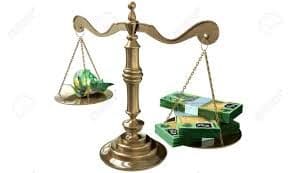Is justice only just for the rich?
Despite 20 years of reported economic growth in Australia, many people live in poverty. Reported estimates range from 11.8% to 20% of Australians living in poverty with an annual household income of approximately $33,911. A report by the Australian Council of Social Service estimates that of the 2.2 million people who live below the poverty line, over a quarter of them are children.
With the divide between rich and poor ever increasing, are all people equal before the law? What happens to those citizens who are living at or below the poverty line? With legal fees ranging anywhere from $100 to $1,000 per hour, how can individuals afford the same legal support as their counterparts at the upper end of the income bracket? With mainly serious criminal and family law issues and an ever decreasing pool of legal aid lawyers from which to share legal expertise with, is there one justice for the rich and one for the poor?
Poverty plays a big part in not only the inequitable distribution of money; it also impacts access to the goods and services in society including access to legal services. Each of us should receive as Hugh de Kretser, a community lawyer and spokesperson for Community Law Australia, argues, “equal access to the law regardless of [his or her] finances, social situation or location.” However, what is and what should be are two different things. As Kretser continues, “the ability to access quality legal support should be a basic, essential service for all. Without it, he says “the law becomes meaningless.”
Economic inequality like that which is experienced in Australia, results in high levels of violence, suicide, obesity, mental illness, imprisonment and shorter life expectancy. Inequality means that those in lower income groups do not have the same access to opportunities as those in the higher groups.
According to the Australia Institute around half million Australians miss out on legal support each year. The problem with access to justice in Australia is not due to lack of expertise or the number of professionals in the field. It is due to what critics point out is a lack of funding and a lack of priority.
A system underfunded and overwhelmed
People living in poverty rely on public funded support for such things as healthcare, income replacement and legal services. Without a properly funded legal aid system we end up having an unfair and inequitable access to justice. Legal centres are forced to turn people away. As a result, people who have no other option, usually those most vulnerable, end up having little to no legal representation. Kretser highlights how “existing centres are underfunded and overwhelmed with demand.” There are even some areas in Australia where citizens do not even have access to a local legal centre.
Lack of funds also results in lack of quality
Free legal service is often basic as it relies heavily on volunteer lawyers and law students, as well as pro bono help from established law firms and barristers. Legal staff are pressured to try and resolve things quickly so they can help as many people as possible. As a result critics claim, the quality of legal service for those on a fixed income does not even compare to those individuals with a higher net worth.
Not only is access to law a hardship for those in poverty, our legal system and structures also disproportionately and adversely impact the poor, marginalised and disadvantaged. For example, Aboriginal and Torres Strait Islander people are more likely to experience poverty than other Australians, with 19.3% of Aboriginal and Torres Strait Islander people living below the poverty line, compared with 12.4% of other Australians. As a result, not only do people living in poverty and social exclusion come into contact with criminal and administrative controls and sanctions more than any other group in society, it is particularly problematic because it is well documented that a higher percentage of Aboriginal and Torres Strait Islanders also come into contact with the criminal justice system, which means a large proportion of this particularly disadvantaged group is going without access to legal representation.
As Special Rapporteur for the United Nations, Magdalena Sepúlveda Carmona points out, obstacles to legal and adjudicatory processes and mechanisms faced by people living in poverty is not only a “violation of human rights in itself” (ICCPR Art. 14), but “is also the consequence of numerous other rights violations.”
In her report, she further noted that people living in poverty encountering the criminal justice system are not only deprived of the means to challenge the conditions of their arrest, remand, trial, conviction, detention and release; but in civil and administrative matters where legal aid is not available, people living in poverty are also often denied access to justice in matters involving property, welfare payments, social housing and evictions, and family matters such as child custody.
As editors of the alternative law journal criticise, in a wealthy country like ours, not having legal services is “inexcusable.” We need “strong action from government, the legal assistance sector, business and the community to make access to justice real and meaningful in Australia.”
Inaction costs us all by leaving us with an inequitable legal system in which those who can afford it get justice and those who cannot afford it do not.







